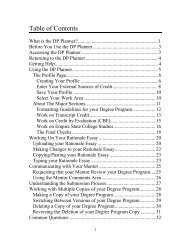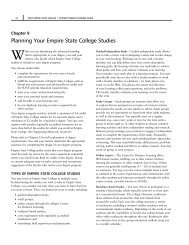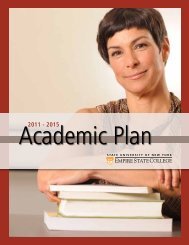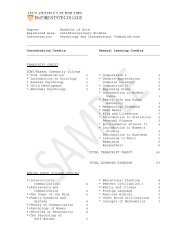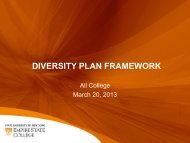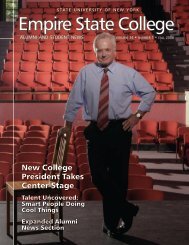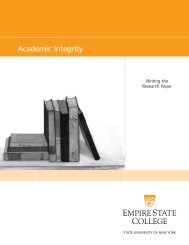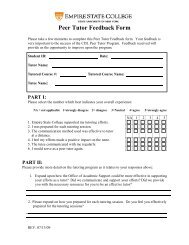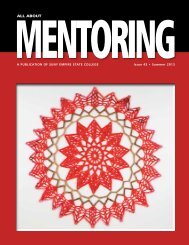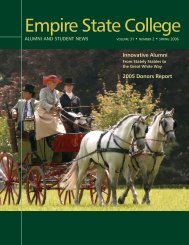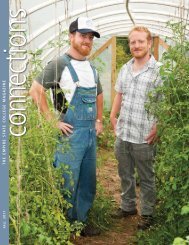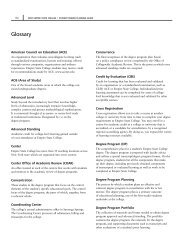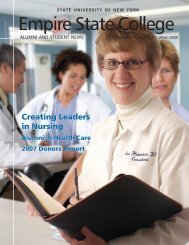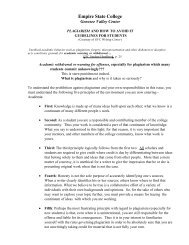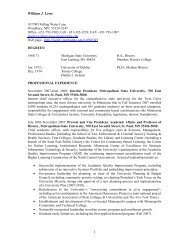All About Mentoring Spring 2011 - SUNY Empire State College
All About Mentoring Spring 2011 - SUNY Empire State College
All About Mentoring Spring 2011 - SUNY Empire State College
You also want an ePaper? Increase the reach of your titles
YUMPU automatically turns print PDFs into web optimized ePapers that Google loves.
68<br />
capacity to go where you need to go and<br />
do what you want to do without needing<br />
advice and assistance. Fundamentally, we are<br />
not so much independent as interdependent.<br />
Friends, family, state, and nation depend<br />
on us and we on them. Therefore becoming<br />
autonomous, “having the capacity to be selfgoverning<br />
and having the right to do so,”<br />
occurs as we manage our interdependence<br />
by recognizing when and where we must<br />
depend on others and when we need not.<br />
<strong>Empire</strong> <strong>State</strong>’s program calls for substantial<br />
independence. It asks students to take charge<br />
of their own learning, to recognize when<br />
they require help and when they don’t,<br />
and to know how to obtain that help. It<br />
asks them to work largely on their own,<br />
with periodic advice and evaluation from<br />
a mentor, but without the usual support of<br />
classmates, roommates, and other friendship<br />
groups established in residential colleges.<br />
Students like Wentworth and Guion,<br />
with wide ranging experiences, strong<br />
commitments, and demonstrated capacity<br />
to get around and act effectively, bring<br />
high levels of independence with them<br />
… In undertaking a new career after 17<br />
years as a factory worker, Emma Schmidt<br />
is making a gutsy step. Success will mean<br />
a wider range of alternatives for her, not<br />
simply because she has a degree, but<br />
because contracts like hers will increase<br />
her capacity to pursue those alternatives<br />
… Bob Lenard’s self-reliance will be tested<br />
in his study and travels with his friend.<br />
When that ambitious undertaking is<br />
completed and after they have faced the<br />
difficulties and decisions which will surely<br />
arise, they will be confident of their ability<br />
to go almost anywhere and do almost<br />
anything.<br />
Self-understanding and understanding<br />
others calls for the capacity to move beyond<br />
relationships of simple understanding to<br />
those where there are sympathetic responses<br />
to diverse kinds of persons and their<br />
conditions. Self-understanding grows rapidly<br />
through such relationships. As we test<br />
ourselves in new experiences and situations,<br />
we come to know ourselves more fully and<br />
to develop more realistic ideas about our<br />
strengths and weaknesses. Why did we<br />
respond like that Where did those attitudes<br />
come from Can we really make these<br />
changes or handle this new opportunity<br />
Life is enriched when we can enjoy a wide<br />
range of different kinds of persons, when we<br />
can go beyond simply tolerating those who<br />
are different and can respond to them as<br />
individuals.<br />
As Donald Wentworth reads about union<br />
leaders such as Debs, Haywood, and<br />
Gompers, and about industrial leaders<br />
such as Ford, Sloan, and Filene, as he<br />
reads Servants of Power and What’s on<br />
the Worker’s Mind, he’ll learn things<br />
about himself, his past, and his fellow<br />
workers that he hadn’t recognized before<br />
… When Bob Lenard looks into the eyes<br />
of a Spaniard, an Italian, and a Greek,<br />
he’ll see new reflections of himself, his<br />
family, and American culture; he’ll bring<br />
back new understandings for a wider<br />
range of future friendships … Janet<br />
Lessinger will meet new cultures and<br />
new autobiographies which will spotlight<br />
different aspects of her own background,<br />
and provide a broader base for meeting<br />
the diverse persons she encounters in her<br />
urban drug center.<br />
Self-consistency exists when word and<br />
deed are not in conflict, when they reflect<br />
beliefs and principles which hold through<br />
changing circumstances. The development of<br />
self-consistency is a two part process. First,<br />
there is the effort to establish a set of beliefs<br />
which makes sense of our own experiences<br />
and insights. Then there is the struggle to<br />
make actions consistent with beliefs. Because<br />
the world continually challenges our beliefs<br />
and pressures us toward behaviors contrary<br />
to them, maintaining self-consistency is<br />
a life-long task. And this is in no way a<br />
celebration of frozen attitudes; growth and<br />
change do not necessarily violate the kind of<br />
consistency we are talking about.<br />
Significant educational experiences<br />
raise important questions concerning<br />
attitudes, values and beliefs. The values<br />
and attitudes behind Wentworth’s long<br />
standing union commitment will get a<br />
thorough going-over as he studies Marx<br />
and Engels and the General Motors strike<br />
of 1936-37. He will find that new and<br />
more complex levels of self-consistency<br />
will have to be created … Chuck Booth<br />
will have a similar experience as he<br />
compares the philosophies of Camus,<br />
Plato, Marcuse, Heidegger, Hegel, and<br />
Kant with his own views, the views of<br />
his Mentor, and the views of the students<br />
who attend his seminar … When Emma<br />
Schmidt confronts questions concerning<br />
effective “Human Services,” as described<br />
by college professors and community<br />
agencies she also will confront questions<br />
concerning human values and the values<br />
behind her own impulse toward a social<br />
work career … Bob Lenard will encounter<br />
values and action expectations which<br />
contrast sharply with his own.<br />
This, then, is <strong>Empire</strong> <strong>State</strong>’s pyramid of<br />
objectives. The forces set in motion by this<br />
institution effect simple communication<br />
skills, intellectual competence, and<br />
significant areas of personal development.<br />
Clearly, these forces will operate with<br />
different intensities for each student,<br />
depending upon his or her purposes, skills,<br />
abilities, and personal characteristics. But<br />
operate they will.<br />
Learning occurs as new conditions require<br />
new responses and as new experiences excite<br />
new reactions. Students will learn because<br />
the experiences built into contracts challenge<br />
their competence, test their purposes, and<br />
question their values. If the challenge is<br />
too limited, or too overwhelming, then not<br />
much learning will occur. The most effective<br />
contract and program of study recognizes<br />
just the right difference between a student’s<br />
present level of learning and development<br />
and what the new plans will require. Then<br />
students can use the forces at work to<br />
move ahead in those areas most important<br />
to them.<br />
suny empire state college • all about mentoring • issue 39 • spring <strong>2011</strong>



